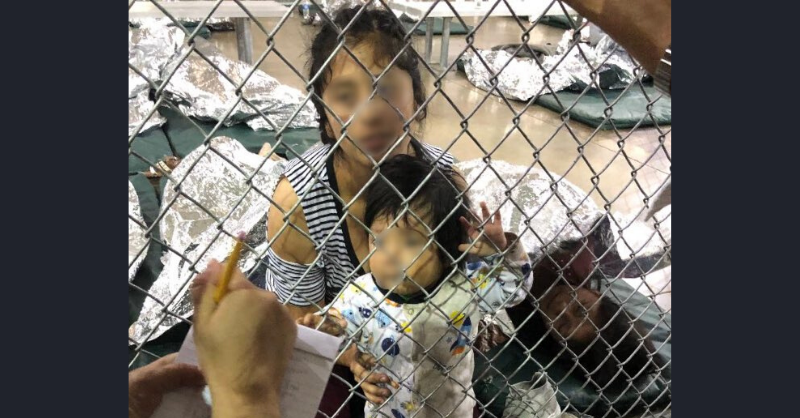
Woman-and-toddler migrants detained at the Ursula detention center in McAllen, Texas, the United States. Photo Source: Twitter @RepSpeier
On World Refugee Day, let us all remember that we continue to send back the vulnerable, the weak and the persecuted, as we deny asylum seekers entry into Canada from the US. Let’s all remember that we still uphold the Safe Third Country Agreement with the US, and with the recent COVID-19 border closures, those escaping their persecutors cannot even seek safety through irregular entry points.
According to the 2004 agreement, Canada and the US recognize each other as safe places for refugees seeking protection. Under the agreement, people seeking asylum must make their claim in the country they arrived in first, and cannot make the claim at Canada-US borders. The loophole is that the agreement only mentioned the official border crossings, and so refugees have been using irregular crossings to make their claim. During COVID-19, and due to the closure of borders, refugees were also sent back from irregular crossings. Among other human rights organizations, Amnesty International has called several times on Canada to suspend the agreement following measures taken by US President Trump against migrants and refugees. With the pandemic closures, the situation is even more dire for those who seek our protection.
It is shocking how we are still considering the US safe for refugees, asylum seekers, and migrants. We have all seen the inhumane conditions of the detention cells they hold refugees in, and the arguments in court that it was not compulsory for the government to provide toothbrushes, soap, or adequate bedding to them. We all know of the 1500 children who went “missing”, and we have heard of the dozens who died. By now we must all know how the US police treat persons of colour, and we have all witnessed how the US Government has had no qualms about sending out the military to fend off peaceful protesters. Are we truly still comfortable with an agreement that deems the US “safe” for any refugee or any person of color?
We must remember why people seek asylum, why a family would leave its home behind and escape to a place that is not particularly welcoming. It is not to have a “better” life, it is to have a “life”. These are people running to us for safety. Can you imagine what it feels like to live in fear? Most of us are privileged for never having to live in fear, and it is so hard for many of us to even imagine it. A woman I know who immigrated to Canada from an oppressive country, not even a war-torn country, told me:
“For a whole year, I slept fully clothed and with a duffle bag that had some necessities because I was waiting for them to come detain me. They always come at dawn, we call them “dawn visitors”, they knock down our doors and snatch us from our beds and take us to undisclosed locations for weeks, sometimes months. Those weeks always include some kind of torture that ranges from sleep deprivation to rape and electrocution. All I did, was speak up against their atrocities. The first time I slept, truly slept and in my PJs was the night I arrived in Canada.”
This woman said she can’t imagine what it would feel like for those fleeing war and armed conflict, just as we can’t imagine how she felt. Remember that we are turning away those who have come seeking safety and mercy. Remember that we are turning them away to be mistreated and maybe killed, like George Floyd, in the US, or tortured and raped in their country of origin. All you need is to consciously remind yourself that this is what we are doing. It is like your neighbour banging on your door because her partner is trying to kill her, and you just hand her back to him.
We have pledged, committed, and promised the world, through being signatories to international treaties, and through our own speeches, that Canada is compassionate, Canada is helpful, and Canada is safe. Can we honestly continue to say that when we turn people away to the US? Are we being compassionate to that mother when we send her and her children back to the detention prison cells in the US where her children might be taken away from her, or where she is denied medication? Or where the US would send her back to her country where her life is threatened?
What would it take to repeal that agreement? Agreements are improved and changed all the time, as we have seen several times over the past few years. Then why do we find it so difficult to stand up for the vulnerable, not for their rights, but for their lives and safety? How, I ask, is this even a subject for debate? Our Canadian values dictate that this should be a given, not a subject for debate.